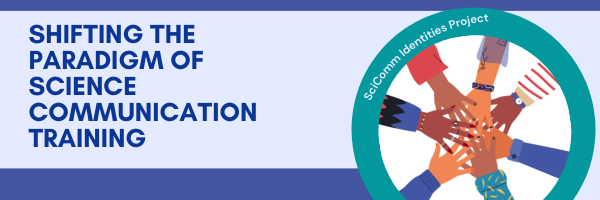New Grant Aims to Increase Racial and Ethnic Minority Representation Among Science Communicators
Metcalf Institute and Michigan State University’s Knight Center for Environmental Journalism Awarded Collaborative $2.8 million NSF grant to launch the innovative program.
The need to engage diverse communities in conversations about science, combat widespread misinformation, and build public trust in science has increased demand for science communication training. However, this training typically takes a one-size-fits all approach that ignores cultural nuances and researchers’ varied communication goals.
The University of Rhode Island’s Metcalf Institute, Science and Story Lab and Michigan State University’s Knight Center for Environmental Journalism are launching an ambitious five-year research project and fellowship program designed to build the next generation of science communicators from diverse racial and ethnic backgrounds. This new SciComm Identities Project (SCIP), supported by a $2.8 million collaborative National Science Foundation (NFS) grant and led by co-principal investigators Sunshine Menezes and Bruno Takahashi, will address a significant gap in science communication research and training by centering the perspectives of racial and ethnic minority scientists.
“A critical step in advancing effective science communication is ensuring that training methods are inclusive and intersectional, recognizing and valuing different cultural perspectives,” says Sunshine Menezes, Metcalf Institute executive director and clinical associate professor of environmental communication. “This project is a critical part of the effort to build evidence-based science communication curricula. We’re thrilled to help more researchers of color become go-to, trusted sources for the news media, legislators, communities, the public, and other stakeholders.”
Filling the Research Gap in Intercultural Science Communication
The first year of the initiative will focus on compiling relevant data on the ways that race and ethnicity inform science communication approaches, an area that few science communication studies have explored until now. The study, undertaken in collaboration with a wide range of science communication training organizations via the SciComm Trainers Network, will test the extent to which the professional norms of science, technology, engineering, and mathematics (STEM) relate to the communication practices of underrepresented minority scientists.
“Research in science communication has yet to examine how scientists’ cultural identities and scientific training interact to influence communication strategies and practices. This research project will utilize theoretical insights from intercultural communication research to examine scientists’ identities from an intersectional perspective,” says Bruno Takahashi, Knight Center research director.
The study will bridge intercultural communication theory and science communication practice. The research team will explore how scientists’ feelings of being understood, respected, and valued in the context of science communication are formed. The project will also examine how the social context of science communication training, including diversity among trainers and explicit discussions about inclusion and equity, influence trainees’ approaches to science communication.
Fellowship Designed for Pre-Tenure Faculty of Ethnic Minorities
URI and MSU teams will launch a new science communication training program, the SciComm Identities Project Fellowship. Across three one-year cohorts, the fellowship will prepare 60 pre-tenure faculty of color to apply their unique experiences and perspectives to their science communication activities. As part of the fellowship, fellows will contribute to a new, peer-reviewed podcast. The fellowship will also prepare SCIP participants to engage in various science communication activities throughout their careers and lead related efforts at their home institutions.
The findings of this first-ever study will be shared broadly to shift science communication training toward a more culturally responsive model.
A call for applicants will be released later this year for the first SCIP Fellowship cohort, which is slated to begin in January 2023.
National Science Foundation
This material is based upon work supported by the National Science Foundation under Grants DRL-2115971 and DRL-2115522. Any opinions, findings, and conclusions or recommendations expressed in this material are those of the authors and do not necessarily reflect the views of the National Science Foundation.

